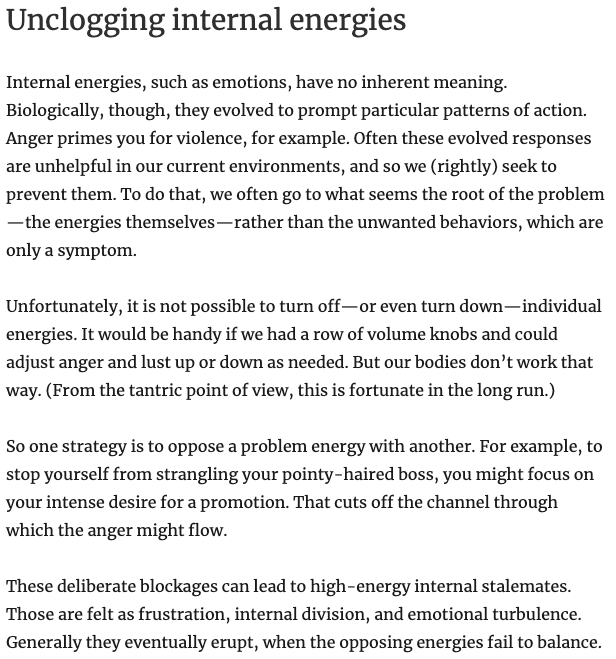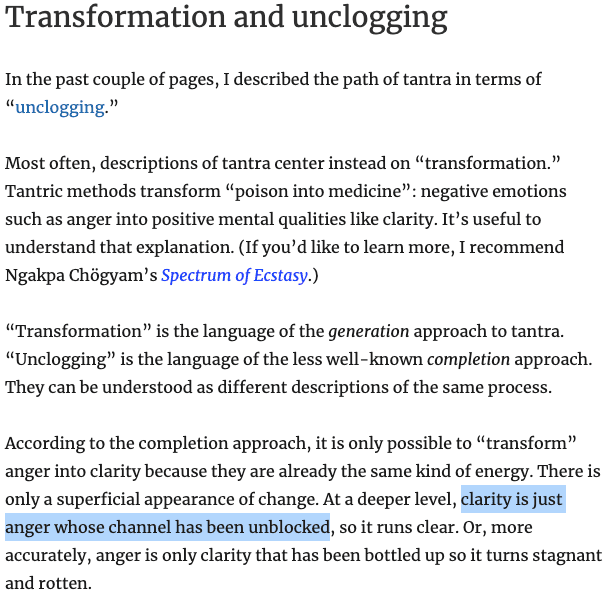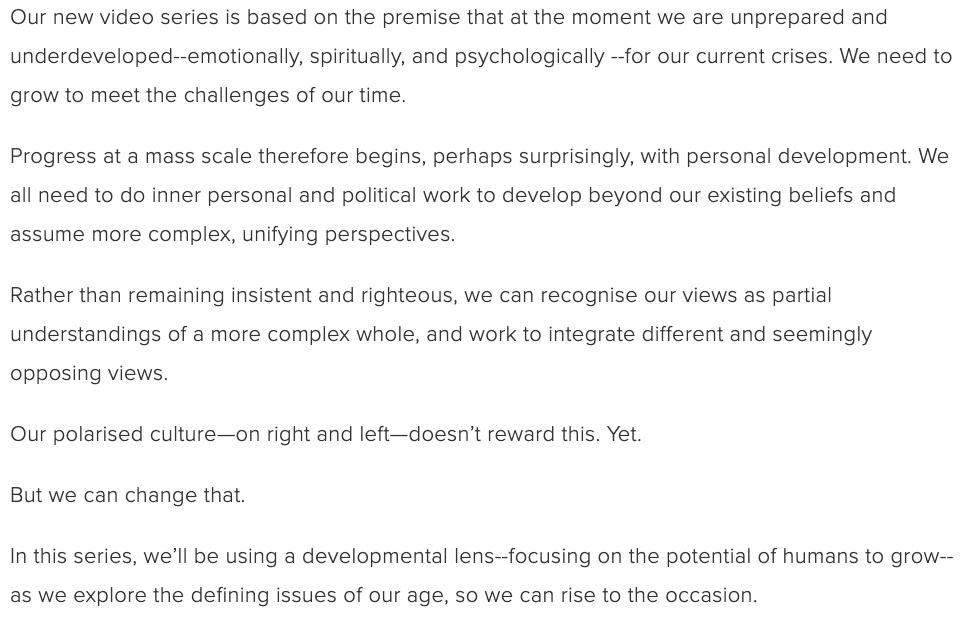🧵 View Thread
🧵 Thread (66 tweets)

100-opinion challenge from @vgr on emotional self-regulation (might end up being more like @visakanv's "machine gun brainstorm" though, no guarantees) https://t.co/E7Tiw7b5LF

1. one of the most important skills i've ever developed is the capacity to feel more intense emotion - anger, sadness, fear, even happiness - without going "unconscious", e.g. without flying into a rage and throwing things for anger

2. you can practice developing your capacity to allow more and more intense emotion by letting the feeling of something arise in your body without needing to do anything with it (of course the opposite practice of learning how to release it bodily can also be helpful)

3. a lot of what's hard about allowing intense emotion is that it brings up other emotions - e.g. you may feel afraid of feeling angry, ashamed of feeling sad, etc. - and you can learn how to be with all of that too, although you may hurt yourself trying so be careful

4. @Meaningness describes two important skills that tantric practice can develop (and that i think i've developed other ways): 1) loosening the need to feel a particular way about particular situations, and 2) loosening the need to do a particular thing with a particular emotion

@Meaningness 5. it can be helpful to take the internal family systems perspective that you have a bunch of "parts" and that your parts are feeling various emotions, e.g. one part may be feeling sad and another may be feeling angry at the sad part; helps you get some distance

@Meaningness 6. for me it's especially helpful to relate to my parts as small children (which they often are in some sense), so i can feel compassion for their suffering see also: https://t.co/lniaUCpfoj

@Meaningness 7. the way many people emotionally self-regulate in practice is by either fighting an emotional energy with another one (e.g. sadness with anger as above) or shutting their emotions down generally; @Meaningness also talks about this; there's another way! https://t.co/HqZSUhm2Uj https://t.co/LKzFbJYyk6


@Meaningness 8. it is possible to let go of the stance that emotions have any fixed meaning. feeling fear doesn't have to mean you're weak; feeling sadness doesn't have to mean you're a crybaby; feeling anger doesn't have to mean you're bad or evil much easier to allow emotion this way

@Meaningness 9. you don't have to do emotional regulation alone, although sometimes you may have no other choice. we naturally regulate each other. being around a calm person who's attuned to you is calming. you can learn to be this sort of person for others as well

@Meaningness 10. and, skillfully helping others with their emotions is hard and most people don't know how to do it! by default people also attach fixed meanings to *others'* emotions - e.g. if my friend is sad i must be sad with them and try to help them or else i'm a bad friend

@Meaningness 11. you can learn to let go of your meanings about others' emotions as well, and just sit with their emotion and help them sit with it too. this may involve doing some work on your own about e.g. your insecurities around being a bad friend

@Meaningness 12. it's actually not helpful to hold onto things like "i have to be sad when my friend is sad", it leads to other people holding things like "i can't tell my friend i'm sad because i'll make them sad and that'll hurt them"

@Meaningness 13. what people want is *attunement*, which is hard to describe and hard to pin down and most people don't even have the word for it so they talk about other stuff that's nearby but not really it. attunement means you are *with them* in the emotion

@Meaningness 14. a nearby thing that some people do is just feeling the emotion because the other person is feeling it; this is more properly termed "not having emotional boundaries" and while it is kinda cool as a kinda psychic power it's also a pain in the ass if you don't know how to stop

@Meaningness 16. it can actually be dangerous to start looking at your own emotions in too much detail if you also have a strong inner critic; sometimes you just end up finding more stuff to criticize about yourself. in this situation prioritize working with the inner critic itself first

@Meaningness 17. this is turning into a thread about just straight up emotional regulation not just self-regulation and i'm okay with that; other-regulation and group regulation are super important topics and i wanna talk about them

@Meaningness 18. i want to say more clearly that a lot of these tweets are coming from a strong sense that people's individual and group relationships to emotions could be so, so, so much better than they are. shit is ludicrously bad compared to what i've seen is possible

@Meaningness 19. and, it's not all upside, there are genuine risks to making groups more emotionally open, a lot of which have to do with severely traumatized people and people with personality disorders (not a huge fan of that term but it's pointing at a real and important phenomenon)

@Meaningness 20. one thing that can get out of hand is that emotional openness can release strong feelings of affection and intimacy that many people only know how to interpret romantically / sexually and that can cause lots of problems if people don't know how to sit with those also

@Meaningness 21. there's a lot to learn about learning how to sit with strong feelings of attraction without needing them to mean anything (e.g. "omg soulmates!") or needing to act on them (e.g. "omg i have to ask you out now!"); you can learn to just enjoy their raw energy

@Meaningness 22. one of the most important practical lessons about strong emotions about other people is that they're often much more about you than about them. you fall for someone b/c they remind you of an ex; you hate someone b/c they remind you of an ex; projection is extremely real

23. important subexample of projection: if you've ever felt suspiciously strong desires to win the approval of somebody, especially a mentor kinda figure but even a romantic partner, consider the possibility that you're projecting a parent onto them

25. gonna switch topics for a bit to tackling specific emotions. let's start with anger, i have a lot of trouble with that one. many of us judge ourselves for getting angry and/or are afraid of our anger because we don't want to be like our angry parents (in my case my dad)

26. but anger properly worked with is extremely important. as @Meaningness says, anger is the stagnant form of clarity. i don't claim to know everything he means by that, but in my experience anger is a path to understanding what you care about and are wiling to protect https://t.co/txfAL3998J


27. anger transformed into clarity can be beautiful. people's voices can ring out. they can become extremely articulate. some people, remembering how their parents yelled at them, can't imagine an angry voice feeling good, but anger transformed into clarity feels *good* to hear

28. if you want to try exploring your relationship to anger, you can try a sentence stem completion: complete a sentence like "if i get angry then that means..." as many times as you can, letting the sentence complete itself w/o thinking, and see what comes out and what resonates

29. there's a kind of person who puts a lot of effort into suppressing and disowning their anger and those kinds of people may find that an anger release exercise (e.g. yelling and punching the air somewhere isolated) can do even more than crying can to help them come alive

30. and, there's also an opposite pattern of getting addicted to anger and lashing out. this also gets into the distinction between anger and rage and hatred. i think there's a kind of person who only knows how to set boundaries using hatred and this is really very unfortunate

31. there's a connection to be made here between learning how to sit with and work with anger and disarming the culture war, but i'll leave it as an exercise to the reader so we don't get too far off track from the topic of emotional regulation

32. if you find yourself feeling a ton of anger and not knowing what to do with it you can try exploring why that anger feels necessary. i think it's often something like "because [these people] need to understand how badly they hurt me" but unfortunately it mostly doesn't work

33. i find that often when i'm feeling anger at somebody or something in particular it's because i'm blaming them for some kind of suffering, and that when i can really take in that blaming them doesn't accomplish anything good the anger gives way to grief

34. i think the reason anger gives way to grief there is that the anger gets tied up with a desire that the past be different, which is impossible; and once i recognize that and really accept it, i grieve for the past as it was and will always be

35. (what can change about the past, though, is your relationship to it: the meaning you make of the past is always up for grabs, and this is a subtle but important distinction. things definitely happened but who knows what they meant, really?)

36. i really wish i had separated out this anger thing into its own thread so i could add stuff to it later but too late, switching to fear now fear is a tricky one for me to talk about because i bet other people (women, PoC) experience a hell of a lot more of it than i do

37. i am lucky enough to not feel or be in actual physical danger hardly ever, and i am *still* often crippled by fear, esp. of rejection my fear feels "young" to me; feels like it comes from the youngest parts of me still afraid of my parents or teachers or the other kids

38. in my experience fear is often being suppressed by shame. it's depressingly common to be shamed for being afraid of things growing up and that shit sticks hard. it really sucks b/c meanwhile fear can genuinely be such a valuable indicator that something might be actually bad

39. it can be really valuable to pay attention to subtle fears you have about other people in particular, esp. people you feel like you have no obvious reason to be afraid of; that can be an indicator you're picking up on subtle but real emotional stuff in them

40. (or it could be projection, or a mix of both, none of this stuff is hard-and-fast) there just are people out there who are fucked up and will hurt you if you get close to them and do a good job disguising this on paper; it's okay to be afraid of them w/o a legible reason

41. a lot of what i work with in clients and myself is fear of the internal world generally. people are so afraid of their own minds and bodies. there's so much pain and trauma there that we weren't taught how to look at. breaks my goddamn heart. so much more is possible here!

@QiaochuYuan Yes https://t.co/lm77Odwl4n

Beneath the floor of the comparatively neat dwelling that we call our consciousness lie unsuspected Aladdin caves Here there be jewels and jinns, inconvenient or resisted psychological powers that we have not thought or dared to integrate into our lives

42. self-fear can manifest in subtle ways. some signs you're heading near internal territory you're terrified of: suddenly feeling sleepy, getting confused, losing focus, holding your body very still and breathing very shallowly, losing short-term memory, going nonverbal

43. normally people avoid the things they fear, and this can often be healthy and the right choice, *and* some people are so paralyzed by fear that they say "fuck it" and become counterphobic and actively seek out things that terrify them / remind them of their past traumas

44. counterphobia can be retraumatizing but it demonstrates something important: fear doesn't compel you to avoid something. you can even learn to enjoy the experience of fear, esp. once you've seen how much you can grow from staring squarely at what you're afraid of

@RichDecibels you're welcome! can you ask her if she thinks @fortelabs' summary here captures the main points? if so i think i disagree with at least some of it: https://t.co/xVSme3dMGV

part 2 begins here: https://t.co/aVqp1MPAui

@QiaochuYuan No that link to trauma is useful - I'll go read the body keeps the score. Although carefully... https://t.co/QEbxJt35uu

@RichDecibels @alteregonetwork @RonanHarrington into this! https://t.co/U35JHDSc3N https://t.co/hMbAD9rIbi


@Meaningness elaborated this into its own thread, not a fan of the wording i used anymore b/c it's natural to feel sad that our friends are sad, *and*... (sorry david can't figure out how to untag you) https://t.co/JzORQccI43

this is a tricky but important thing to talk about so i'd like to clarify, the wording here is slightly off many of us are not sharing with our friends / loved ones how much pain we're actually in because we worry it's so much we would be hurting them; i wanna talk about this https://t.co/KieoFKFE9Q

@QiaochuYuan @Meaningness She is sad, depressed, unwell, bleak etc. Almost instantly I am energised, silly, loud, manic, fun. I'm clearly trying to avoid empathising, or feeling responsible for bringing her out of her state, or something like that. But currently it is unconscious, instinct. Dumb.